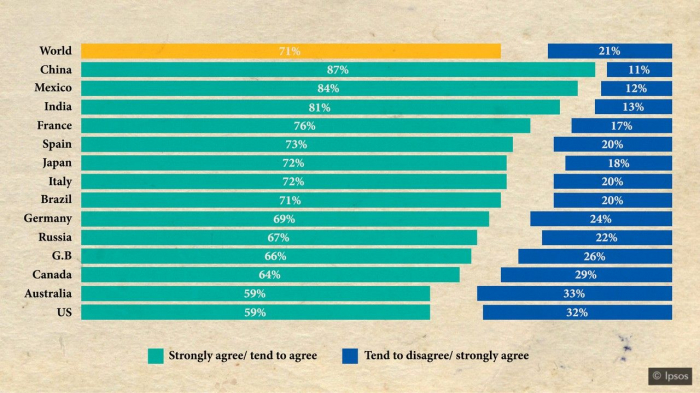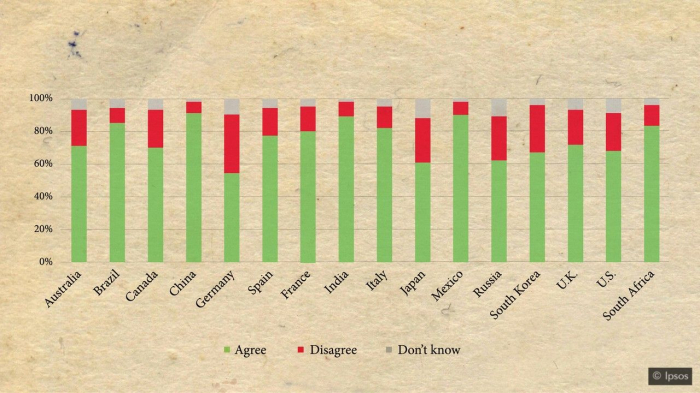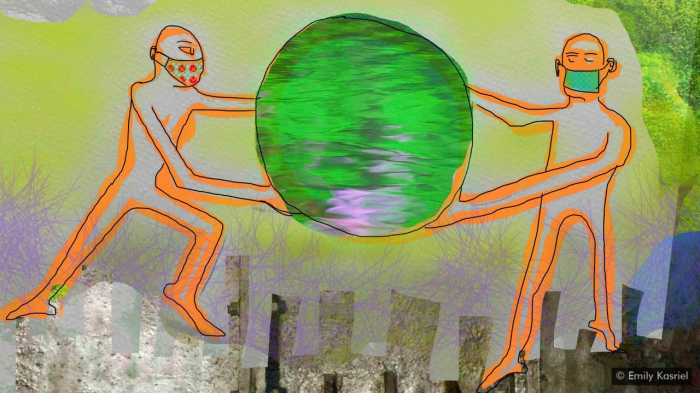By Emily Kasriel
Has the pandemic helped individuals, industry and government get any closer to tackling the environmental crisis?
“I was so worried about the dangers of going too far,” says Sally Capp, Lord Mayor of Melbourne, when she now thinks about her pre-pandemic leadership on the environment. The leader of Australia’s second most populated city believes Covid-19 has helped her clarify what’s important to her as an individual and as mayor. “I have become much more resolute about my values, prioritising humanity and protecting the environment, so they can play a larger role in driving my agenda.”
The pandemic has created the most significant economic shock since the Great Depression, besides being a public health crisis like no other in living memory. The existential threat that it has posed has set many individuals, cities and national leaders on a new track. In Capp’s case, it has meant taking very different decisions on the environment, leading in a way that focuses on what’s truly important. Capp believes this trend needs to continue post Covid-19.
There is indeed a large movement to “build back better” from the pandemic in a way that confronts the climate crisis. Attitudes are changing. But however good our intentions as individuals, it will take determined moves by industry, national and local government to modify the environment so that we can all build on any attitude changes. Has the pandemic helped us make the changes needed to tackle the environmental crisis?
Many people across the world retreated into radically different lives during the lockdown. The desire to stay safe created some dramatic mass behaviour changes that some academics have likened to a massive experiment.
Many of these changes in the way we act have had a sustainable dimension, such as curtailing the vast majority of our long-distance travel. Our reduction in movement has led to the biggest carbon crash ever recorded.
As the world has changed around us, how has that changed our perception of the environment and our behaviour towards it? Elise Amel, a professor in psychology at the University of St Thomas in St Paul and Minneapolis, points out that when people can see the impact they cause – when the invisible becomes visible – they behave differently. “When you are spending time at home, working there or because you’ve lost your job or been furloughed, you could see for the first time how much energy you are using or how much food you are throwing away, which may make you stop, think and change your behaviour,” says Amel.
Many of these temporary sustainable shifts have been incidental side effects of our response to the danger of the virus, rather than being motivated by our concern for the planet. However, if we continue to walk and cycle more it may mean we will take up other pro-planet behaviours, which environmental psychologists term the “spillover effect”. For example, recycling plastics may foster our identity as someone who cares about protecting our planet, which in turn could makes us want to eat less meat.
However, Jo Hale, a research fellow at University College London who studies sustainability and health in urban environments, warns that if we take part in one pro-environmental activity we may feel we have a moral license to stop there, a tendency known as “single-action bias”. As we have ticked the sustainable box we may think we have played our part.
One impact of staying local during lockdown has led to many of us spending more time in nature, with rich rewards for our wellbeing. Google Trends shows that during worldwide lockdowns the global number of online searches for “bird sounds”, “identify trees”, and “growing plants” reached double what they were a year ago.
Research indicates that this greater immersion in nature may also change our attitudes toward the environment. Matthew White, an environmental psychologist at the University of Exeter, conducted a large-scale study prior to Covid 19 which found a positive correlation between our exposure to the natural world and pro-environmental behaviours like planting trees or managing hedgerows for birds. There is also evidence suggesting a causal link between time spent in nature and more sustainable behaviour, though this is less well documented.
One of the mechanisms by which contact with nature may encourage us to take more green actions may be the feeling of awe that we experience when we spend time in the natural world, according to early research. This experience of wonder we feel when we look up at the multitude of stars in our Milky Way, or the expanse of a tree trunk whose canopy is lost in the mist can enable us to see our own diminished self in the context of a much larger whole. This new perspective can encourage us to behave more generously to others and to our planet.
However, White points out that this correlation between contact with nature and pro-environmental behaviours doesn’t hold true when it comes to our holiday travel. Research pre-Covid indicated that spending time in nature has no impact on our willingness to jump on a plane for a city break or a seaside experience.
There are also other significant challenges to behaviour change. Many of us from New Delhi to Los Angeles have savoured the clearer skies and less polluted atmosphere flowing from the cut in our travel and emissions during lockdown, but extensive research underlines the common-sense knowledge that old habits die hard. According to Wendy Wood, a professor at the University of Southern California who is a world-renowned expert on habits, “there is good reason to believe that as soon as life starts up, people will be triggered back into old habits, like jumping automatically into your car”. The framework of our old ordinary lives is still there – the car waiting on the driveway and the kids who need fetching from school.
Three years ago, Wood conducted a study in which she shared evidence with a group of people about how much healthier it was to avoid sugar in food and drink. “It was easy to convince them this was a good idea, as there is lots of powerful information out there to back this up, so armed with the knowledge, they changed their attitudes dramatically.”
But later that day, Wood gave the same group a choice of drinks to sample in a taste test, among them sugary options like fizzy orange or cola. “The vast majority chose to drink a sugary beverage.” While Wood agrees that any change of attitude may have more of an impact when it comes to us making larger considered decisions, like the purchase of a car, choosing what to drink or how to get to work is a result of a habit, based not on our considered thoughts but on our daily experience.
Turning point
However, Wood believes the massive disruption in our routines caused by the pandemic may present an opportunity for us to move to a more sustainable lifestyle, but only if leaders are willing to take decisive steps to alter the cues around us. Otherwise, we are likely to slip into old patterns. Wood is on an advisory board of the Los Angeles Metro and focuses on helping get people in LA out their cars and into the habit of using mass transit. However, as mass transit is not a healthy option right now, there is a search for other sustainable alternatives. “My impassioned appeal to the transit authority is to start opening the streets to scooters, cycles and pedestrians,” she says, “but so far, they’ve only agreed to open 20 miles of road, a drop in the ocean of LA’s freeways”.
Research also indicates that while politicians may think it is challenging at such a disruptive time to implement policies that they believe to be unpopular, many of these policies, whether charging for plastic bags or putting in place a congestion charge, often develop far more support when they are implemented as people can see the benefits to their city and to their environment.

It is, of course, not just governments that can encourage positive environmental changes enacted during lockdown. Hale points to the opportunity business has to implement systemic sustainable policies in response to Covid-19 lockdown experiences. The technology company Twitter has permitted all staff to work from home indefinitely. The global management consultancy company McKinsey, which advises CEOs of some of the world’s largest companies, has prompted corporations to seize the moment to decarbonise, arguing that companies have fresh opportunities to “make their operations more resilient and more sustainable as they experiment out of necessity”. There is also a close interplay between corporate and government actions. A number of large firms have written to the UK government, prompting them to make the recovery green.
A recent global Ipsos Mori poll found a recognition by the public that individuals aren’t the biggest actors in the story of climate change.
“There has always been a huge focus on behaviour change when it comes to global warming mitigation, but now the public is demanding that industry and government pull their weight,” says Jessica Long, the pollster’s head of sustainability. In the May 2020 poll, three in four people polled across 16 countries expect their government to make protection of the environment a priority when planning a recovery from the coronavirus pandemic.

Long says across the countries that Ipsos polled in 2019 “the number one global issue was the environment. Four out of five people polled felt that we are headed towards an environmental disaster”. What took Long and her pollster colleagues by surprise were the results of the recent polling which indicates that Covid-19 hasn’t detracted from this. “Over 70% of respondents across the world report that, in the long term, climate is as serious a crisis as Covid-19. In April 2020 poll, well over half of the international sample said that they would be put off voting for a political party whose policies didn’t deal seriously with climate change.
Are political leaders ready to take more radical action to protect the planet and address man-made climate change? This challenge is especially pertinent when many of them are negotiating one the most challenging economic landscapes in living memory alongside mass unemployment. In addition, with many people feeling public transport is no longer safe, there are pressures to allow private cars greater freedom in the city, which could roll back sustainable city improvements made over decades.
In April, Emmanuel Macron, the President of France, spoke to the Financial Times in the mid of the country’s lockdown. “We all face the profound need to invent something new, because that is all we can do,” he argued. “We have stopped half the planet to save lives, there are no precedents for that in our history.” People have come to understand “that no one hesitates to make very profound, brutal choices when it’s a matter of saving lives. It’s the same for climate risk,” he added. However, this public promotion of a radical reset hasn’t convinced some environmentalist members of Macron’s own party, who have since abandoned their leader to create a new more left-leaning and ecological party.
Perhaps the change will be driven by cities, not countries. Mark Watts leads C40, a network of the world’s megacities committed to addressing climate change. Since Covid-19 he has been convening a bi-weekly meetings of the big city mayors to discuss tackling the epidemic and how to manage a green recovery. Watts told me the sense of possibility is palatable, even in a virtual meeting. “The mayors are treating this time as a massive game-changing moment. This epidemic experience will have been the greatest pressure that most of these individuals have been under, as hundreds of thousands of people have been dying in their cities. But with increased public trust in government, they are sensing this is the moment they have to be strong and bold to take radical steps to protect our environment.”
Since coming into power two years ago, Melbourne’s Mayor Capp has been committed to climate action, declaring a climate and biodiversity emergency in 2019. However, Covid-19 has given her permission to radically accelerate environmental improvements to her city. “Now we’re rolling out some of our bicycle lane ambitions in one year, improvements which were meant to take place over a decade,” she says. The city has also just announced it will be planting 150,000 trees, shrubs and grasses in the next six months, a unprecedented greening of the Melbourne landscape, in contrast to far more tentative pre-Covid steps. As Capp explained with a smile in her voice, “Now I’ve got more chutzpah.”
Source: BBC
More about: #climatechange
















































